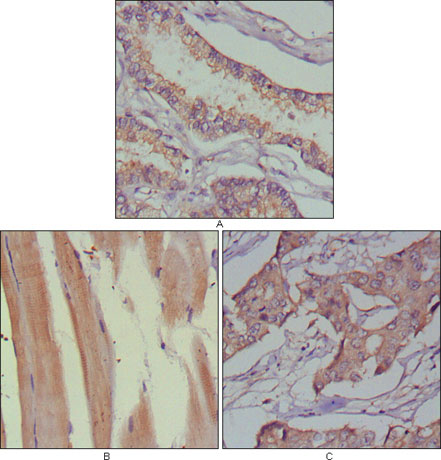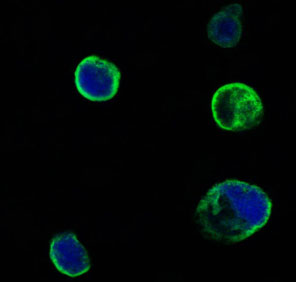MUSK Antibody
Purified Mouse Monoclonal Antibody
- 产品详情
- 实验流程
Application
| IHC, ICC, E |
|---|---|
| Primary Accession | O15146 |
| Reactivity | Human |
| Host | Mouse |
| Clonality | Monoclonal |
| Clone Names | 10A4 |
| Isotype | IgG1 |
| Calculated MW | 97056 Da |
| Description | MuSK (for Muscle Specific Kinase) is a receptor tyrosine kinase required for the formation of the neuromuscular junction (NMJ). It induces cellular signaling by causing the addition of phosphate molecules to particular tyrosines on itself, and on proteins which bind the cytoplasmic domain of the receptor. It is activated by a nerve-derived proteoglycan called agrin. During development, the growing end of motor neuron axons secrete a protein called agrin.This protein binds to several receptors on the surface of skeletal muscle. The receptor which seems to be required for formation of the neuromuscular junction (NMJ), which comprises the nerve-muscle synapse is called MuSK. MUSK mutations lead to decreased agrin-dependent AchR aggregation, a critical step in the formation of the neuromuscular junction. |
| Immunogen | Purified recombinant extracellular fragment of human MUSK (aa24-209) fused with hIgGFc tag expressed in HEK293 cell line. |
| Formulation | Ascitic fluid containing 0.03% sodium azide. |
| Gene ID | 4593 |
|---|---|
| Other Names | Muscle, skeletal receptor tyrosine-protein kinase, 2.7.10.1, Muscle-specific tyrosine-protein kinase receptor, MuSK, Muscle-specific kinase receptor, MUSK |
| Dilution | IHC~~1/200 - 1/1000 ICC~~N/A E~~N/A |
| Storage | Maintain refrigerated at 2-8°C for up to 6 months. For long term storage store at -20°C in small aliquots to prevent freeze-thaw cycles. |
| Precautions | MUSK Antibody is for research use only and not for use in diagnostic or therapeutic procedures. |
| Name | MUSK |
|---|---|
| Function | Receptor tyrosine kinase which plays a central role in the formation and the maintenance of the neuromuscular junction (NMJ), the synapse between the motor neuron and the skeletal muscle (PubMed:25537362). Recruitment of AGRIN by LRP4 to the MUSK signaling complex induces phosphorylation and activation of MUSK, the kinase of the complex. The activation of MUSK in myotubes regulates the formation of NMJs through the regulation of different processes including the specific expression of genes in subsynaptic nuclei, the reorganization of the actin cytoskeleton and the clustering of the acetylcholine receptors (AChR) in the postsynaptic membrane. May regulate AChR phosphorylation and clustering through activation of ABL1 and Src family kinases which in turn regulate MUSK. DVL1 and PAK1 that form a ternary complex with MUSK are also important for MUSK-dependent regulation of AChR clustering. May positively regulate Rho family GTPases through FNTA. Mediates the phosphorylation of FNTA which promotes prenylation, recruitment to membranes and activation of RAC1 a regulator of the actin cytoskeleton and of gene expression. Other effectors of the MUSK signaling include DNAJA3 which functions downstream of MUSK. May also play a role in acetylcholinesterase (AChE) localization at the neuromuscular junctions (NMJ) via its interaction wit COLQ (By similarity). May also play a role within the central nervous system by mediating cholinergic responses, synaptic plasticity and memory formation (By similarity). |
| Cellular Location | Postsynaptic cell membrane; Single-pass type I membrane protein. Note=Colocalizes with acetylcholine receptors (AChR) to the postsynaptic cell membrane of the neuromuscular junction |
Research Areas
For Research Use Only. Not For Use In Diagnostic Procedures.
Application Protocols
Provided below are standard protocols that you may find useful for product applications.
REFERENCES
1. J Neuroimmunol. 2006 Aug;177(1-2):119-31. 2. Ann N Y Acad Sci. 2008;1132:76-83.
终于等到您。ABCEPTA(百远生物)抗体产品。
点击下方“我要评价 ”按钮提交您的反馈信息,您的反馈和评价是我们最宝贵的财富之一,
我们将在1-3个工作日内处理您的反馈信息。
如有疑问,联系:0512-88856768 tech-china@abcepta.com.
¥ 1,500.00
Cat# AO1287a























 癌症的基本特征包括细胞增殖、血管生成、迁移、凋亡逃避机制和细胞永生等。找到癌症发生过程中这些通路的关键标记物和对应的抗体用于检测至关重要。
癌症的基本特征包括细胞增殖、血管生成、迁移、凋亡逃避机制和细胞永生等。找到癌症发生过程中这些通路的关键标记物和对应的抗体用于检测至关重要。 为您推荐一个泛素化位点预测神器——泛素化分析工具,可以为您的蛋白的泛素化位点作出预测和评分。
为您推荐一个泛素化位点预测神器——泛素化分析工具,可以为您的蛋白的泛素化位点作出预测和评分。 细胞自噬受体图形绘图工具为你的蛋白的细胞受体结合位点作出预测和评分,识别结合到自噬通路中的蛋白是非常重要的,便于让我们理解自噬在正常生理、病理过程中的作用,如发育、细胞分化、神经退化性疾病、压力条件下、感染和癌症。
细胞自噬受体图形绘图工具为你的蛋白的细胞受体结合位点作出预测和评分,识别结合到自噬通路中的蛋白是非常重要的,便于让我们理解自噬在正常生理、病理过程中的作用,如发育、细胞分化、神经退化性疾病、压力条件下、感染和癌症。







